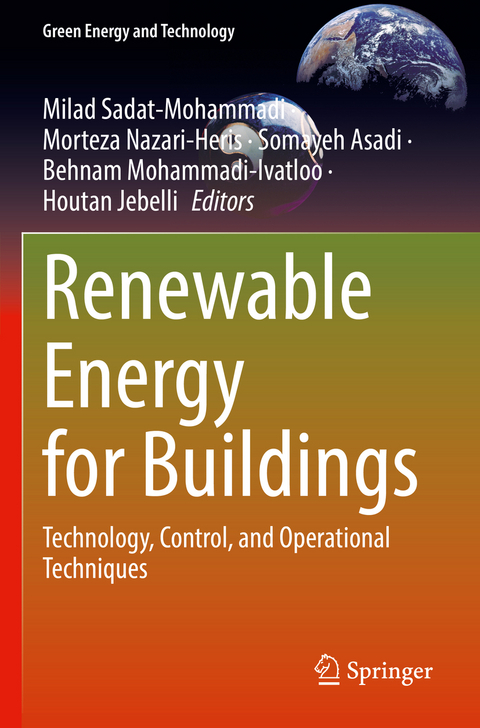
Renewable Energy for Buildings
Springer International Publishing (Verlag)
978-3-031-08734-9 (ISBN)
- Examines the most recent developments in building energy systems;
- Looks at practical applications and theoretical aspects;
- Includes case studies.
lt;p>Dr. Milad Sadat-Mohammadi is a Research Assistant at the Pennsylvania State University. Milad is pursuing his doctoral degree as well as his second master's degree in electrical engineering and computer science focused on deep learning and machine learning. He earned his first master's degree in electrical engineering (focused on planning and managing energy systems) from Tehran Polytechnic University. His research interests include smart energy systems, intelligent energy management in residential and commercial buildings, machine learning, deep learning applications in energy systems, energy storage technologies, and renewable energy sources. Milad has received several awards and scholarships, including the best undergraduate student award, best thesis award, and Borda Graduate Scholarship, respectively, in 2016, 2019, and 2021. He has published several peer-reviewed articles; and, He serves as a reviewer of a number of journals and is an active member of professional communities.
Dr. Morteza Nazari-Heris, PhD, is a Graduate Research Assistant in Areas of National Need in the Department of Architectural Engineering at the Pennsylvania State University. He obtained BSc and MSc degrees in Electrical Engineering from the University of Tabriz. His main areas of interest are electric vehicles, micro grids, smart grids, integrated heat and power networks, and energy storage technologies. He has received several awards and fellowships, including outstanding national master and PhD student, selection among the top-rated applicants from the College of Engineering in recognition of the strength of academic record, three Outstanding Thesis Awards, and selection as IEEE PES DAY 2021 Ambassador in the IEEE Section Category from Central Pennsylvania Section. He also was selected as the Architectural Engineering Outstanding Graduate Student Awards and received the Borda Graduate Scholarship in Honor of Gifford H. Albright-Scholarly Excellence and GORDON D. KISSINGER GRADUATE RESEARCH FELLOWSHIP-Educational and Research Enhancement. He serves as an editor and reviewer for several journals and symposia and is an active member of professional communities like Institute of Electrical and Electronics Engineers (IEEE), Clean Energy Leadership Institute, and Young Professionals in Energy.
Dr. Somayeh Asadi is an Associate Professor in the Department of Architectural Engineering at the Pennsylvania State University. She also serves as a graduate program officer and is a Fulbright Specialist. Prior to that, she was an Assistant Professor at Texas A&M University. She serves as an assistant and associate editor of various journals, including ASCE Journal of Construction Engineering and Management, Journal of Engineering, Construction, and Architectural Management, Buildings, IEEE Access, Advances in Electrical Engineering, Electronics, and Energy, among others. Dr. Asadi specializes in sustainable building and built environment, integrated building design systems, energy management, renewable energy systems, and smart grids. To date, her research efforts have resulted in more than 80 peer-reviewed journal articles, more than 10 book chapters, three books, and more than 60 peer-reviewed conference papers. Her research efforts include 12 externally funded projects as a PI and Co-PI, including 3 from the National Science Foundation, 3 from the Pennsylvania Department of Environmental Protection, 3 from the US Department of Energy, and 3 from Qatar National Research Foundation, resulting in more than $5 million in research project funding in total.
Dr. Behnam Mohammadi-Ivatloo, Ph.D., is with the Department of Electrical and Electronics Engineering at Mugla Sitki Koçman University, Turkey. He was previously a Senior Research Fellow at Aalborg University, Denmark. He is also a Professor at the University of Tabriz, from where he is currently on leave. Before joining the University of
Integrating Solar Panels, Solar Thermal Systems and Small-Scale Roof-Mounted Wind Turbines in Buildings.- Introduction and Literature Review of Bioenergy and Geothermal Systems in Buildings.- Introduction and Literature Review of Building Components With Integrated Renewable Energy Generation Systems.- Risk Modeling in Operation of Renewable Energy Generation Systems.- Challenges and Advantages of Bidirectional Energy Transfer Between Building Energy System and Main Grid.- The Role of Energy Storage Systems in Mitigating the Intermittency of Renewable Energy Resources in Buildings.- Introduction and Literature Review of Building Components With Passive Thermal Energy Storage Systems.- Optimal Design and Financial Analysis of Implementing Thermal and Battery Energy Storage Systems in Buildings.- The Role of Energy Storage Capacity of Electric Vehicles (EVs) in Increasing the Flexibility of Building Energy Management Systems.- Optimal Scheduling and Operation of Building Energy Generation and Storage Systems.- Introduction and Literature Review of Home Energy Management Systems.- Optimal Operation of Thermostatic Loads Based on Predicting Residents' Preferences.- Application of Machine Learning for the Intelligent Operation of Building Energy System.- Residential Load Pattern Recognition and Prediction Based on User's Activity Pattern.- Intelligent Data-driven Techniques in Optimizing the Energy Consumption in Buildings.
| Erscheinungsdatum | 05.09.2023 |
|---|---|
| Reihe/Serie | Green Energy and Technology |
| Zusatzinfo | IX, 124 p. 40 illus., 32 illus. in color. |
| Verlagsort | Cham |
| Sprache | englisch |
| Maße | 155 x 235 mm |
| Gewicht | 242 g |
| Themenwelt | Technik ► Elektrotechnik / Energietechnik |
| Schlagworte | Battery Energy Storage • Bidirectional Energy Transfer • bioenergy • Electric Vehicles • Energy Consumption in Buildings • Energy Storage Systems • Geothermal systems • green buildings • Home Energy Management • Load Pattern Recognition and Prediction • Renewable Building Components • renewable energy • Solar Thermal Systems • Wind Turbines |
| ISBN-10 | 3-031-08734-8 / 3031087348 |
| ISBN-13 | 978-3-031-08734-9 / 9783031087349 |
| Zustand | Neuware |
| Informationen gemäß Produktsicherheitsverordnung (GPSR) | |
| Haben Sie eine Frage zum Produkt? |
aus dem Bereich


